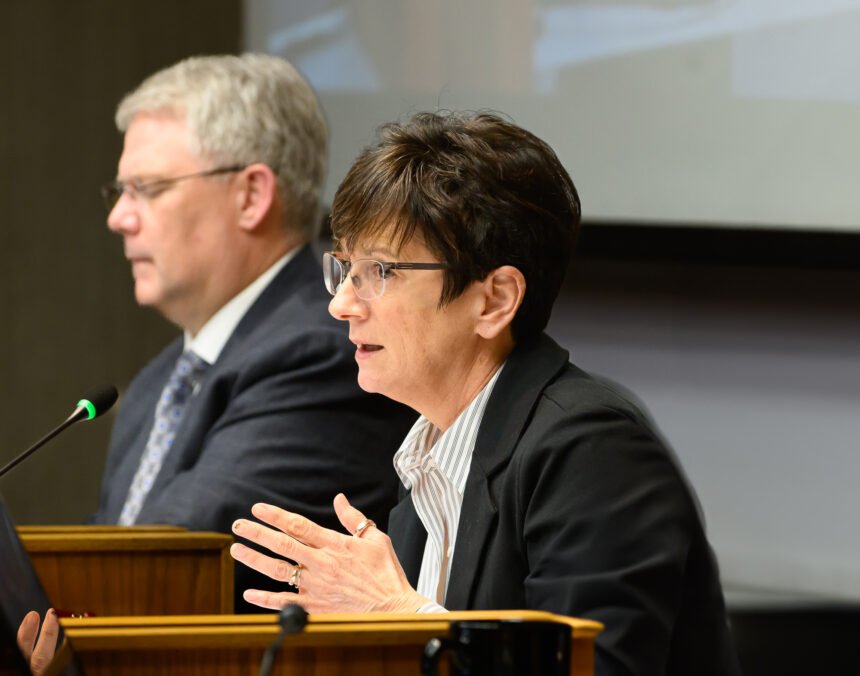Mayor Julie Hoy and Salem city councilors appear to have engaged in an illegal serial meeting leading up to the departure of former Salem City Manager Keith Stahley in February, a state investigator concluded in a preliminary report.
That report led the ethics commission last week to vote in favor of pursuing a full investigation into Hoy and the entire city council.
The vote came as an investigator’s early review found there’s a basis to believe city officials violated the state’s open meetings law.
READ IT: Ethics investigator’s report
The investigation can take up to six months.
Salem Reporter obtained the investigator’s May 9 report and accompanying exhibits through a public records request.
The report provides more detail on the circumstances surrounding Stahley’s surprising ouster, which became public on Feb. 10.
Investigator Joshua Sullivan’s report found that between Feb. 1 and 10, Hoy had a series of conversations with a majority of the city council through phone calls, text messages and meetings.
Those conversations considered Stahely’s performance and continued employment with the city and occurred before the council publicly voted to accept Stahley’s resignation, the report said.
The investigator wrote that it appears that through those conversations, Hoy was gathering information from city councilors that could be used by the council to decide about Stahley’s employment.
The Salem City Council includes Council President Linda Nishioka and councilors Micki Varney, Vanessa Nordyke, Shane Matthews, Paul Tigan, Deanna Gwyn, and Irvin Brown.
Oregon law generally requires governing bodies like city councils to meet in public. Closed meetings are allowed only to consider specific topics, and final decisions must be voted on in public.
Outside of public meetings, elected officials can’t use “serial” communications over email, phone or other means to decide or deliberate on matters. That includes communicating through an intermediary.
The state last fall adopted new rules to clarify the ban on serial meetings. City councilors, including the mayor, were given guidance on those changes, city spokeswoman Erin Neff said.
When Stahley’s ouster came to light, city officials struggled to provide an explanation of how the city manager had been asked to resign without any public discussion of his performance or employment.
City officials first said Nishioka asked Stahley to resign on behalf of the mayor and a majority of the council. They later backtracked and said Nishioka acted independently. They said she suggested Stahley resign after she was given the impression by Hoy that most of the seven councilors supported Stahley’s ouster.
Nishioka has since maintained that she suggested Stahley resign to spare him the embarrassment of a public termination.
Hoy did not respond to questions from Salem Reporter about their reaction to the commission’s decision to investigate, while Nishioka declined to comment.
In the aftermath of Stahley’s departure, two Salem residents filed complaints to the state ethics commission, one on March 12 and the other on March 17.
The complaints alleged Hoy and councilors violated the state’s public meetings law through serial communication about Stahley’s employment. Both complaints cited investigative reporting by Salem Reporter into the circumstances of his departure.
In an April 9 letter to the commission investigator, Jill Gibson, a private attorney representing Hoy, maintained that the mayor’s conversations with councilors were focused on providing information and expressing concern about a recent audit of Stahley’s leadership.
She said Hoy reached out to councilors individually to inform them that “the audit existed and the councilors should read it because Mr. Stahley intended to not bring it to the attention of the council directly.”
“Mayor Hoy told the councilors that in light of the information in the audit, the council may need to ask for his resignation,” Gibson wrote. “Mayor Hoy was very aware of the requirements and prohibitions of the public meetings law because she had sought and received advice from City Attorney (Dan) Atchison prior to making the calls.”
READ IT: Mayor Julie Hoy’s attorney’s response to inquiry
Separately, city officials retained an outside attorney, Chad Jacobs, to respond to the complaint. Jacobs wrote the commission on March 7.
“Except for possibly one discussion, the Mayor refrained from sharing the views of councilors with other councilors during these conversations. Rather, she explained her concerns and asked the councilors with whom she spoke about their feelings towards the former city manager,” he wrote.
Investigators didn’t find those explanations persuasive.
Sullivan concluded that Hoy may have acted as an intermediary, effectively holding a meeting out of public view to discuss Stahley’s employment.
“It further appears that during these conversations Julie Hoy was gathering information from city councilors that could be used by the city council to make a decision about Keith Stahley’s ongoing employment with the city,” Sullivan wrote in his report.
He cites a Feb. 10 text message from Nishioka to Interim City Manager Krishna Namburi where Nishioka said Hoy told her that a majority of the council supported Stahely’s resignation.
“Based on the information available in this preliminary review, there appears to be a substantial, objective basis for believing that Julie Hoy and the other members of the Salem City Council may have violated provisions of Oregon Public Meetings Law,” Sullivan concluded in his report.
If the commission concludes Hoy and councilors violated open meetings law, they could be issued a letter of education or fined.
They could also agree to settle the case and stipulate a final order.
During her appearance before the commission on June 13, Hoy said she would not have made the calls if she knew it was against the law, modifying her attorney’s earlier statement that she was fully aware of the rules after consulting with the city attorney.
She told the commission she lacked the necessary training and experience to understand her behavior might have violated state law.
“I would not have made these phone calls had I known that the ethics commission would have viewed them as a serial meeting. We have a need in Oregon for greater education for all electeds, myself included,” Hoy told the commission. “I am truly a volunteer and not a politician. I do not have years of experience in this role, and I am here to learn. People like me who don’t do this kind of work all the time need the education and information that you can provide for us.”
State law requires elected officials in cities the size of Salem to undergo training in public meetings law at least once per term in office. Hoy was elected to the city council in 2022 and held the seat until she was sworn in as mayor in January.
Neff, the city spokeswoman, said the city provides periodic training to city councilors and also updates the council when changes to state law and administrative rules concerning public meetings take place. She said such training is part of orientation for new councilors.
The possible serial meeting is not Hoy’s first brush with ethical concerns on the council.
Last spring she received a warning from Stahley after she promoted a Salem tire shop for a city contract, nearly violating city ethics rules. At the time Hoy was a city councilor and a mayoral candidate running against former Salem Mayor Chris Hoy. The two Hoys are not related.
During Chris Hoy’s tenure as mayor, Hoy, along with Councilor Deanna Gwyn, was publicly censured by a majority of the council after she did not recuse herself from voting on a land use appeal that benefitted a major campaign donor.
That campaign donor was prominent Salem developer Larry Tokarski who donated $20,000 to Hoy’s mayoral campaign. Mountain West Investment Corp. donated $19,000 to Hoy’s campaign. Tokarski is the president of Mountain West.
RELATED COVERAGE:
Records reveal Nishioka wanted to sue Hoy after Stahley resigned
A timeline of statements surrounding Salem city manager’s resignation
Mayor Julie Hoy set in motion events that led to Keith Stahley’s abrupt resignation
City reverses course, saying councilor never asked city manager to resign
Stahley out as Salem city manager
Contact reporter Joe Siess: [email protected] or 503-335-7790.
A MOMENT MORE, PLEASE – If you found this story useful, consider subscribing to Salem Reporter if you don’t already. Work such as this, done by local professionals, depends on community support from subscribers. Please take a moment and sign up now – easy and secure: SUBSCRIBE.
Joe Siess is a reporter for Salem Reporter. Joe joined Salem Reporter in 2024 and primarily covers city and county government but loves surprises. Joe previously reported for the Redmond Spokesman, the Bulletin in Bend, Klamath Falls Herald and News and the Malheur Enterprise. He was born in Independence, MO, where the Oregon Trail officially starts, and grew up in the Kansas City area.











